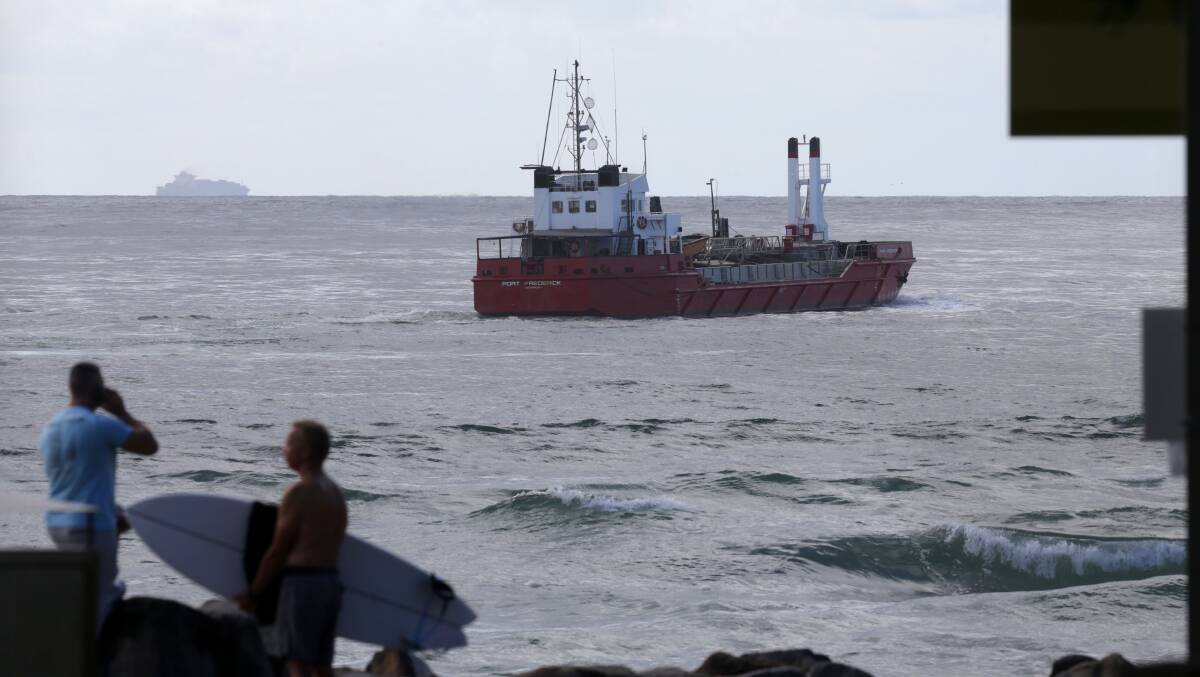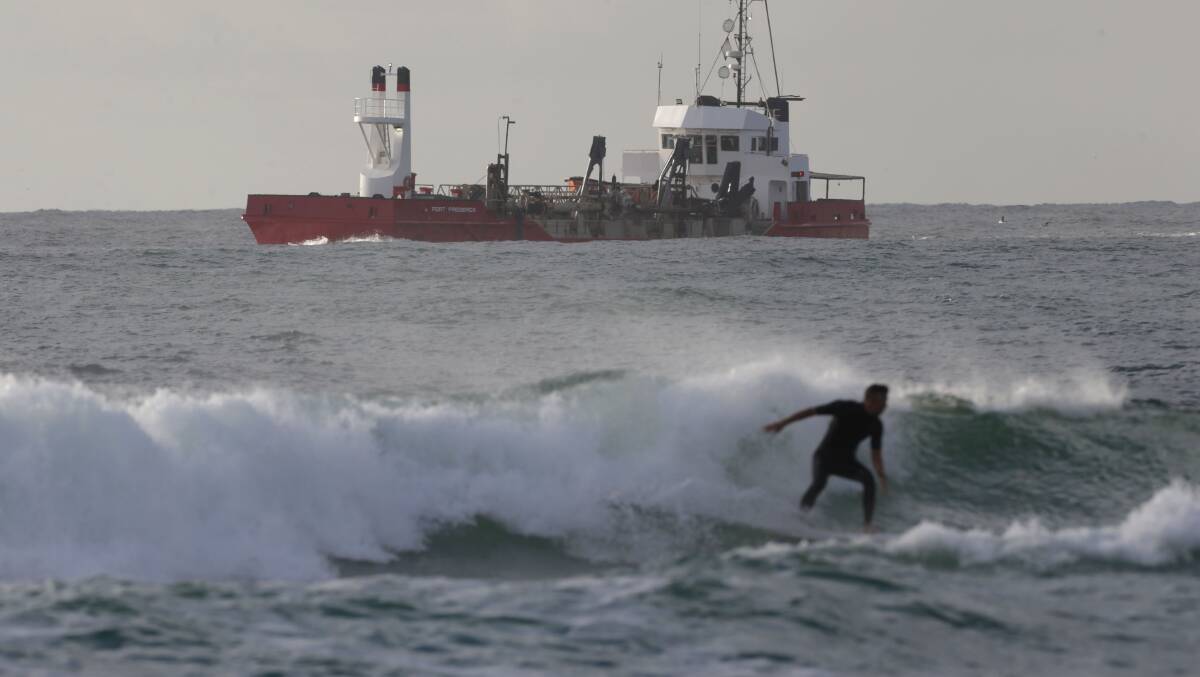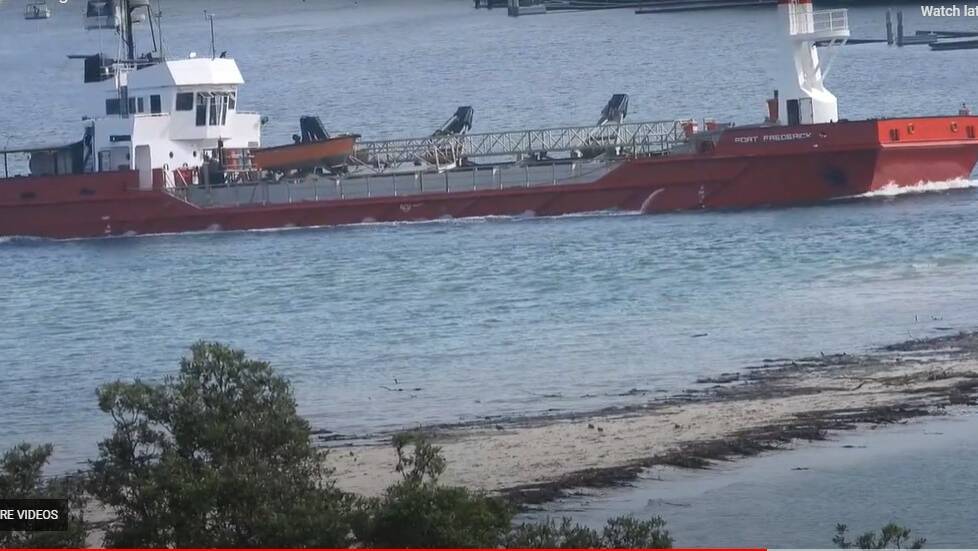
Conservationists seeking to have the dredging of Port Hacking suspended until April, when most migratory birds will have departed, have taken their case to the federal government, while also calling on Sutherland Shire Council to "immediately cease" the operation.
Create a free account to read this article
$0/
(min cost $0)
or signup to continue reading
BirdLife Australia initially contacted the NSW Environment Minister James Griffin, but were advised this week it was a federal matter.
A state government source said the Eastern Curlew, the species that is the subject of concern, is listed as critically endangered under the Australian Government's Environment Protection and Biodiversity Conservation Act 1999 (EPBC Act), and matters relating to it should be referred to the Australian Government.
BirdLife Australia conservation campaigner Andrew Hunter said the organisation had written to the council requesting that the dredging activities near migratory shorebird habitat cease until April when the majority have departed on their northern migrations.
The council had been told the dredging was likely to cause a significant impact.
Mr Hunter said the local branch of BirdLife Australia, BirdLife Southern NSW, had lodged a referral to the federal Department of Climate Change, Energy, the Environment and Water advising the activity does not comply with the EPBC Act.
"BirdLife Australia is deeply concerned about the Sutherland Shire Council's dredging activities that are disturbing critically endangered migratory shorebirds," he said.
"These birds are highly sensitive and any disturbance risk them using valuable calories they need to successfully make the 10,000 km trip and breed in the Arctic summer.
"An independent Review of Environmental Factors (REF) for the project stated that dredging works should only happen after April when migratory shorebirds had already departed.
"However, the dredging activities have already commenced in a direct breach of this independent report and likely breaching Australia's national environmental legislation, the EPBC Act.
"BirdLife Australia has sought legal advice and written urgently to the council calling for an immediate cease to the dredging while a potential EPBC breach is investigated."

Earlier
Dredging in Port Hacking is continuing while the state government reviews the impact on migratory birds.
The dredge Port Frederick has been sucking up sand from clogged navigation channels and transporting it around the headland, where it has been seen making drops off Cronulla beach, the rock pools and The Wall.
The sand is expected to be washed in and renourish storm battered beaches.
Shorebird experts from BirdLife Australia were appealing to Environment Minister James Griffin on Friday to stop the dredging until April - as originally proposed - allowing time for the birds to build up before their long flight back to the northern hemisphere.
Cronulla MP Mark Speakman was also concerned.
"On Friday, as soon as I read the story in the Leader, I asked the NSW Environment Minister James Griffin to urgently review the migratory birds issue," Mr Speakman said.
The shorebird experts have challenged Sutherland Shire Council's interpretation of the findings of a Review of Environmental Factors (REF) on the issue.
Mayor Carmelo Pesce said, "Until we hear otherwise, we are moving ahead".
"The state government approved the project.
"The contractor has done this work for us previously and is very experienced, operating all along the eastern seaboard."
Cr Pesce said the contractor's services were in great demand and that's why the project wasn't able to be started until this year.
"We have a window of opportunity, which we need to use it," he said.
Cr Pesce said he had received only one approach to stop the dredging compared with a large amount of positive feedback, particularly from boat owners who either feared damage to their craft or had already experienced it.
Earlier
The state government is being called upon to step in and stop the dredging of Port Hacking until after migratory shorebirds depart on a long flight home to the northern hemisphere.
Shorebird experts are challenging Sutherland Shire Council's interpretation of the findings of a Review of Environmental Factors (REF) and are referring the matter to Environment Minister James Griffin.

Concerns were first raised on February 21 by Julie Keating, who was named by the council the Sutherland Shire Environmental Citizen of the Year for 2022 for her work in supporting shorebirds in Port Hacking.
Ms Keating said the Avian Specialist Report in the REF for the project noted there was not going to be any impact on migratory shorebirds because the action was going to occur in winter, when the birds were away on migration.
"However, the dredger turned up on Sunday," she said.
A YouTube video shows birds fleeing in alarm as the dredge passes.
Ms Keating said, "When the dredging timetable appeared, Birdlife Australia tried to get the start moved to April, when the critically endangered eastern curlews would have left for migration".
"That was ignored," she said.
"The next five weeks are critical for the eastern curlews as they try to pack on enough weight for their non-stop flight from here to the Yellow Sea, a flight that can take up to 12 days.
"The eastern curlews have one of the highest levels of protection available, being protected under the Federal EPBC Act and 3 international treaties."
The council responded on February 23, saying an independent expert assessment determined the dredging was unlikely to cause any significant or negative impacts to migratory shorebirds or their habitat.
"Dredging vessels will travel along a pre-approved route which will see them pass no closer than 200 metres away from migratory shorebird habitat," a spokesman said.
"Dredging vessels will also not be in operation as they pass these areas, ensuring minimal risk to these environmentally sensitive habitats."
The spokesman said the works were being conducted by a leading industry operator with sound experience in conducting dredging along the Port Hacking, having been engaged to do this work a number of times previously.
"All dredging and sand placement activities will be conducted in strict compliance with mitigation measures set out under an independently drafted REF and in accordance with relevant project approvals and licences," he said.
Avian specialist Phil Straw, a committee member of the Australasian Wader Study Group within Birdlife Australia, said on Friday February 24 the findings in the final REF, including his specialist's report, was that there would be no impact on migratory shorebirds if work was carried out during the off peak season while the birds were on migration.
"Council is inferring, in their statement appearing [online] in the Leader, that it means that dredging can take place during any peak seasons if dredges are only available during that time. Mr Straw said.
"BirdLife Australia and many shorebird specialists challenge this interpretation and are referring the matter to the Minister for the Environment.
"Sutherland Shire Council's interpretations and actions conflict with the EPBC Act [Environment Protection and Biodiversity Conservation Act]."
Mr Straw also challenged the council statement that dredges would pass no closer than 200 metres from migratory bird habitat.
"This is not possible when the navigation channels are less than 200 metres wide," he said.
Ms Keating also rejected the council's statement on the dredging.
"The statement in the REF 'subject to dredging contractor availability' was not part of the expert report," she said.
"This was added by someone else, not the migratory shorebird expert.
"The assumption that the action did not need to be referred was predicated on dredging occurring April to August, not when the dredging contractor was available.
Another migratory bird specialist Dan Weller described the premature dredging as "a massive fail".
"The works window should have been from April onwards for this location and such an action," he said.


